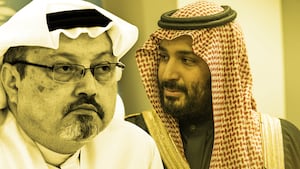Harvard has become the latest institution to spurn association with a top Saudi after the killing of Washington Post columnist Jamal Khashoggi at the Saudi consulate in Istanbul.
Harvard Belfer Center’s Kennedy School disinvited Saudi Prince Turki al Faisal from a long-planned week in residence, the prince told The Daily Beast in an interview at his Virginia home.
“I got notice… very politely saying ‘this may not be the right time for you to come and lecture because of the Khashoggi affair,’” said Turki, the son of the late King Faisal, and former ambassador to the United States.
Georgetown University’s School of Foreign Service, where the former head of Saudi intelligence has taught for a decade, allowed him to finish his fall course.
“I simply can’t understand, someone like me who has not had anything to do with any of what is happening in the Kingdom, to be … stigmatized by innuendo and guilt by association … from an institution like Harvard,” said Turki. “Academic engagement and people’s exchange of knowledge and knowhow should be encouraged, rather than stopped or interrupted,” he said.
Harvard and Georgetown did not respond to multiple requests for comment Friday. Harvard has had a long association with the Saudi royal family, accepting $20 million from Prince Alwaleed bin Talal in 2005 to expand its Islamic studies, according to the Harvard Crimson.
Turki served as Saudi Arabia’s intelligence chief until the summer of 2001. The body is now being reorganized in the aftermath of Khashoggi’s killing at the Saudi consulate in Istanbul.
The kingdom has rounded up more than a dozen military and intelligence officials, including Saud al-Qahtani, a close advisor to the Saudi crown prince, and deputy intelligence chief Gen. Ahmad al-Asiri. Saudi officials claim they only intended to interrogate Khashoggi because of his past acknowledged links to the Muslim Brotherhood, but that the columnist struggled with interrogators and was accidentally strangled.
Turkey’s chief prosecutor says Khashoggi was strangled within moments of entering the consulate to get documents to marry his Turkish fiancée, and his body dismembered in a premeditated assassination.
The current king dispatched Turki’s brother, Governor of Mecca Prince Khaled Bin Faisal, to Turkey to negotiate with Ankara in the aftermath of the Khashoggi affair.
Turki said he was asked by King Salman bin Abdelaziz to speak to Khashoggi’s U.S.-based relatives including his ex-wife and children, whom he’d known for some time as the columnist had worked for him in London and the U.S.
But Turki denied being on any official mission to change minds about the kingdom or rehabilitate the reputation of Crown Prince Mohammed Bin Salman, who some U.S. officials believe may have approved the operation and killing.
“I have not been in touch with Prince Mohammed at all. I have not heard any word from him or any other Saudi officials,” he insisted.
Turki said he and Khashoggi “parted company” a few years ago after Khashoggi “proposed that the Muslim Brotherhood is a viable vehicle for human rights and democracy within the framework of Arab and Islamic political structure…. He felt that they may be archaic and their methods had much to be improved upon. But he had confidence that they were the vehicle to move forward.”
Turki condemned the killing and called for “a clear and very transparent reporting on how, where and what happened exactly — laying it bare on the table for everyone to see, without any hesitation or regrets,” followed by describing what the kingdom will do to “keep it from happening again.”
Turki gave a fiery speech to a Washington, D.C., audience Wednesday, taking advantage of the a long-planned event to denounced the hypocrisy of the U.S., and Turkey criticizing so harshly the kingdom’s handling of Khashoggi’s killing.
He obliquely slammed Washington by saying “countries that have tortured and incarcerated innocent people and that launched a war that killed many thousands of people based on fabricated information should be humble in their regard to others” — a clear reference to the U.S. invasion of Iraq based on faulty intelligence, and its interrogation of terrorism suspects at CIA black sites.
Turki was gentler in his criticism on Friday, recalling previous tough times in the U.S.-Saudi relationship and described the Khashoggi incident as something that must be overcome “simply by engaging.”
“This is the way to go forward, to be open and up front and not afraid of engaging with people who disagree with you,” he said.
“I hope that the present administration would equally work with Saudi Arabia to overcome this,” he said. “We have a saying in Arabic: one hand does not clap.”






